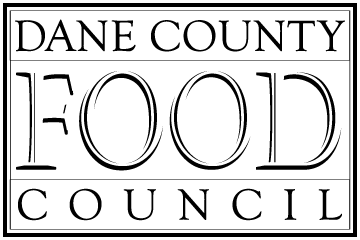
With overwhelming citizen support, including 11 testimonies and over 200 citizen petition signatures, the Dane County Board voted on October 6, 2005 to adopt a resolution to create Wisconsin’s first ever food council.
The food council was created to address food system issues in the county, including:
But the Dane County Food Council’s (DCFC) origins really began more than a year earlier, through a June 1, 2004 act of the County Board’s Environment, Agriculture and Natural Resources Committee. The committee, with the sponsorship of its chair, Supervisor Kyle Richmond, established a 15-person Local Food Policy Advisory Subcommittee (LFPAS), in large part to position Dane County in the burgeoning local food movement. Chaired by Ruth Simpson, the subcommittee met regularly over 13 months, a year highlighted by its organizing a Local Food Summit. Almost 100 attendees from across Dane County provided input into a number of topics related to local food production, food processing and distribution, and food access and consumption. Five months later, this input – together with ideas generated by LFPAS members – formed the basis for the subcommittee’s summary report, Recipe for Success: Recommendations of the Dane County Local Food Policy Advisory Subcommittee.
The Recipe for Success report centered on five recommendation areas. The fifth of these, creating a county food policy council, was supported in the report by a thorough review of the work of food policy councils across the United States and Canada. The LFPAS recommended that a county-created food council would provide the mechanism to address its other recommendations.
DCFC made an early decision to focus on encouraging food system activities already underway. These efforts – creating a farmers’ market network, furthering food purchasing by Dane County government, and supporting an existing market basket distribution program – had mixed success. However, they were valuable in determining what approaches could maximize the council’s effectiveness.
Later in 2007, Council member Gerry Campbell led an effort that resulted in the DCFC’s recognition by the National Association of Counties as a finalist in its Sustainable Community Awards program. NACO also highlighted the council in its publication, Counties and Local Food Systems: Ensuring Healthy Foods, Nurturing Healthy Children. Also in 2007, the Council worked closely with the county food purchasing staff to draft a Local Food Purchase Policy that was adopted as a County Board resolution later in the year.
Throughout its short history, DCFC has maintained a primary focus on strengthening the consumption of locally-grown foods, primarily through public education and outreach. It takes advantage of opportunities to engage the public. The council has also engaged in the larger community food movement; sending its members to meetings to state and national meetings, and engaging in advocacy opportunities.